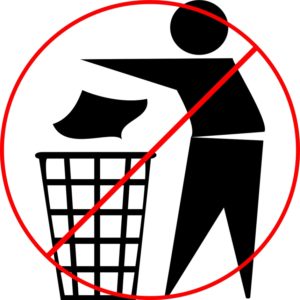 Medical waste containers aren’t trash cans. You can’t just throw anything in them. Only certain items should be disposed of in these special containers. They are designed to contain and seal biohazardous waste for transport. However, some rules can be confusing, which may result in improper use of medical waste containers or improper disposal of biohazardous waste. Simple mistakes can lead to violations of local and state laws, which can result in costly fines.
Medical waste containers aren’t trash cans. You can’t just throw anything in them. Only certain items should be disposed of in these special containers. They are designed to contain and seal biohazardous waste for transport. However, some rules can be confusing, which may result in improper use of medical waste containers or improper disposal of biohazardous waste. Simple mistakes can lead to violations of local and state laws, which can result in costly fines.
Below are some important rules to remember when disposing of waste into medical waste containers.
What Items Go into Medical Waste Containers?
As a rule, any waste item generated from the diagnosis, treatment or immunization of human beings and animals is considered medical waste. In addition, any non medical waste item tainted or contaminated with biohazardous material is also considered medical waste. The following items should be disposed of in medical waste containers:
- Blood and other bodily fluids such as spinal, peritoneal and lymph fluids
- Microbiological waste such as cultures, stocks and discarded biologicals, broths, inoculates, lab samples and live and attenuated vaccines
- Parts of human or animal anatomy (normal or diseased) such as organs, tissues, body parts, nails, hair, teeth and human and animal cadavers
- Sharps wastes including needles, syringes, Pasteur pipettes, capillary tubes, broken glassware from labs, glass slides, razors and scalpel blades
- Pharmacological waste like discarded drugs and expired medicines
- Unused or discarded medicines for chemotherapy and their empty packages and bottles
- Remains or parts of animals used for research and experiments
- Isolation wastes from animal or human highly communicable diseases like Lassa fever virus, Marburg virus, monkey pox virus and Ebola virus
What Items Do NOT Go into Medical Waste Containers?
It’s common for the below items to mistakenly find their way into medical waste containers. But some can cost you and your business a lot of money!
- Diapers: Dispose of contents in the toilet and throw out the rest as municipal waste.
- Soiled linens: Almost all laundry services are able to process regularly soiled linens.
- Dialysate: This must be disposed of in the toilet.
- Urine and/or feces: Discard in the toilet.
- Cardboard packages of medicines: Throw away as municipal waste. However, packages of chemotherapy medicines must be disposed of as chemotherapy waste.
- Trash: Recycle or discard as municipal waste. This includes items like paper, cardboard, waste metal, tin cans, yard clippings, wood, glass and bedding
- Garbage: Items generated from the processing or cooking of food must be disposed of as municipal waste.
Medical waste has immense potential to cause harm. Some items are contaminated with blood and other bodily fluids, which can cause disease. Others, like discarded needles and scalpels, are sharp and may be tainted with pathogens that can cause hepatitis and AIDS. Others contain chemicals like mercury, solvents, disinfectants and heavy metals that can cause birth defects, poisoning and organ damage. Medical waste with radiation can cause burns and increase cancer risk.
There are many reasons for such strict rules and regulations when it comes to disposing of medical waste. The safety reasons are mentioned above, but another is the significant expense. Compared to household waste, collection and disposal of medical waste is much costlier. Therefore, individuals and staff should make a concerted effort to segregate and minimize the generation of medical waste.
At Wellbeing Midwest, we pride ourselves in helping to keep medical waste disposal affordable to our clients. Not only do we provide continuous education on best practices, but we also provide our services with no contracts or hidden fees. Contact us today for a FREE quote.
